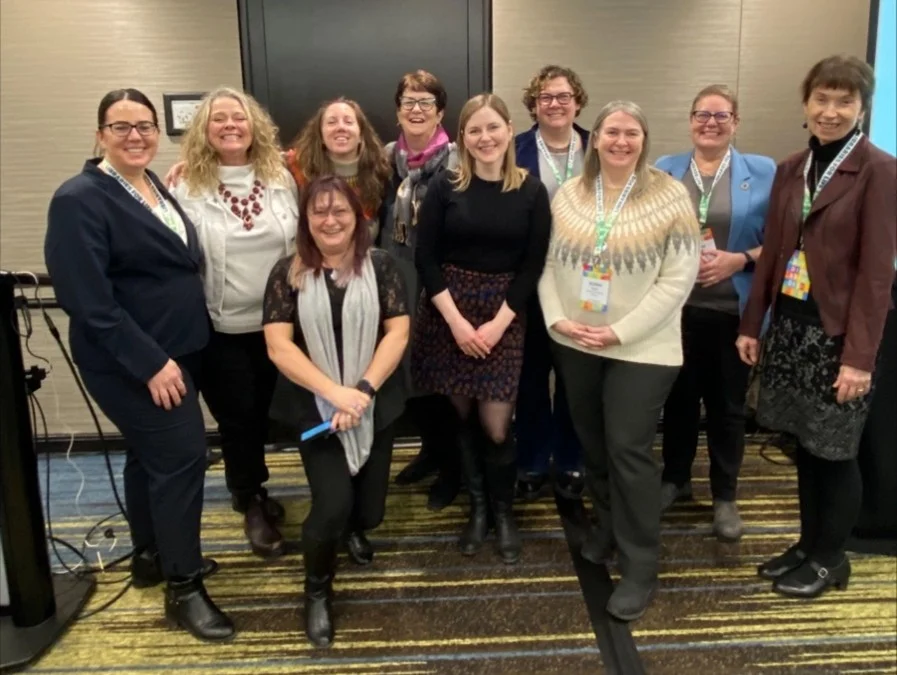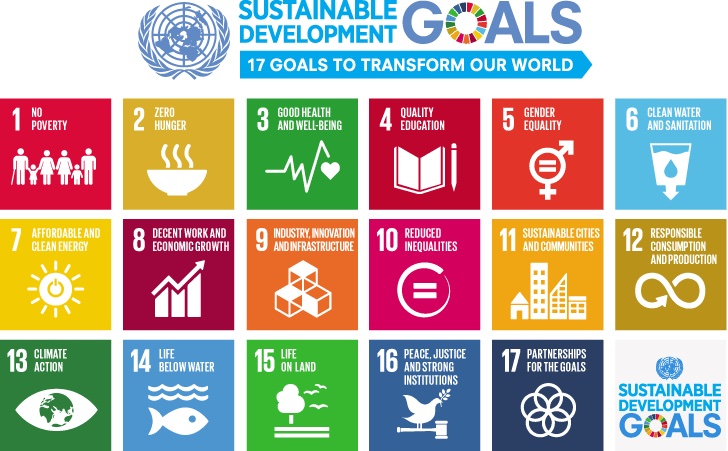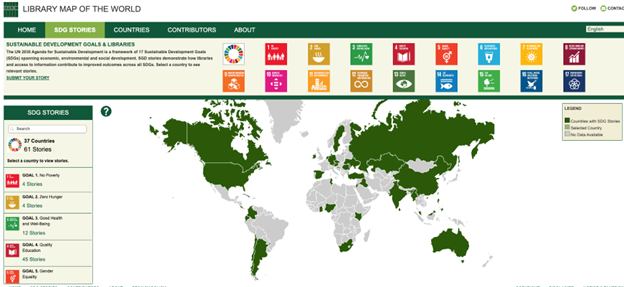By Katherine Klosek and Diane Koen
The recent “Put Your Library on the Map” workshop at the OLA Super Conference provided attendees with valuable insights and practical tools to showcase their libraries’ contributions to the UN Sustainable Development Goals (SDGs). This pre-conference event, sponsored by IFLA North American Regional Division, CFLA-FCAB, and the Toronto Public Library, brought together library professionals from diverse settings to explore evidence-based storytelling approaches.
Setting the Stage: Libraries and their Impact
The workshop opened with a warm welcome from Diane Koen, Chair of IFLA’s North American Regional Division, who emphasized that libraries of all sizes and types have meaningful stories of community impact worth sharing. This was followed by an informative introduction to the UN Sustainable Development Goals by Robin Kear and a comprehensive tour of the IFLA Library Map of the World platform by Vivian Lewis.
Understanding the SDGs
As Robin Kear explained, the Sustainable Development Goals (SDGs) were adopted by all United Nations Member States in 2015 as a universal call to action to end poverty, protect the planet, and ensure peace and prosperity for all people by 2030. The 17 SDGs are intentionally intersectional, recognizing that action in one area affects outcomes in others, and that development must balance social, economic, and environmental sustainability. Kear encouraged workshop participants to connect their daily library work to these universal themes – from programming and collections to community support, sustainability efforts, and open access initiatives.
Kear emphasized that libraries are essential partners in advancing the SDGs because achieving all goals depends on access to information. IFLA has been actively involved since the creation of the UN 2030 Agenda, advocating for the inclusion of access to information, safeguarding of cultural heritage, universal literacy, and access to information and communication technologies within the framework.
One of the strategic goals of the IFLA North America Regional Division Committee for 2021-2025 is to ensure librarians in North America have the advocacy skills needed to demonstrate how libraries contribute to city, state, and local governments’ efforts to achieve progress on the SDGs.
The Library Map of the World as an Advocacy Tool
Vivian Lewis, University Librarian at McMaster University, presented the Library Map of the World as a powerful global advocacy tool that visually demonstrates how libraries worldwide contribute to achieving the 17 SDGs. The “SDG Stories” section of the map currently features 61 narratives showcasing the unique impact libraries and library associations are making in their countries, each tied to a specific global goal. Lewis explained how framing library activities through the lens of SDGs makes their impact more concrete and compelling for stakeholders at all levels.
Lewis emphasized that when libraries provide information at the local level, they are simultaneously providing resources, skills, and tangible ways to achieve progress toward global sustainability goals.
Lightning Talks: Frameworks for Understanding
Two compelling lightning talks provided attendees with frameworks to contextualize their work:
Pilar Martinez, CEO of Edmonton Public Library, and urban strategist Tommi Laitio presented “Convivencia: A Framework for Public Libraries in a World of Divisions,” exploring how libraries can bridge societal gaps and foster community cohesion.
Mary-Jo Romaniuk and Julia Guy from the University of Calgary Library shared insights in “Tell Your Research Story!” about effectively communicating the impact of academic library services on research outcomes and knowledge dissemination.
Real Stories, Real Impact
The workshop featured three inspiring storytelling sessions from library leaders who have successfully connected their work to SDGs.
Katherine McColgan (CARL) and Katherine Klosek (ARL) showcased how research libraries are addressing information inequality through two connected initiatives that advance multiple SDGs. McColgan described methods and findings from the CARL/ARL Task Force on the Marrakesh Treaty, which enables cross-border sharing of accessible materials for print-disabled users. Klosek then highlighted the EMMA (Educational Materials Made Accessible) platform, which helps institutions implement the Marrakesh Treaty by sharing already-remediated texts, ensuring students with print disabilities can access course materials simultaneously with their peers. The EMMA story is the first US story on the Library Map of the World, which is a useful tool for libraries seeking to advance global information equity through strategic partnerships. This work exemplifies libraries’ contributions to SDG 4 (Quality Education) by ensuring equitable educational access, SDG 10 (Reduced Inequalities) by removing barriers for people with print disabilities, and SDG 17 (Partnerships for the Goals) through their international cooperative framework.
Andrea Cecchetto from Markham Public Library demonstrated how public libraries support lifelong learning programs that contribute to SDG 4 (Quality Education). Markham Public Library launched a program, Girls in STEAM, designed to address barriers to gender inclusion in STEAM education and careers. In collaboration with the City of Markham and other local organizations, this 6-week program provided training on digital literacy and STEAM technologies to women in Grade 9, who applied this learning to a capstone project to address an issue or opportunity in their community. The program also partnered participants with women working in STEAM professions for mentorship and social support. The program outcomes include improved feelings of representation and inclusion in STEAM, as well as increased confidence and interest in pursuing STEAM education.
Dana Craig presented York University’s Casita Azul initiative, highlighting collaborative sustainability projects that address SDG 11 (Sustainable Cities and Communities). The Casita Azul project began in 2015 as a collaboration between York University’s library and environmental faculty, establishing a unique academic library open to the public in the remote Las Nubes region of Costa Rica. What started as “a little bit of a lot of things” has evolved into a vibrant community hub serving over 750 community visitors annually, supporting environmental education, literacy programs, and women’s wellbeing projects while creating a safe learning space where local children who struggle in traditional school settings discover a love of reading.
Each storyteller illustrated how they identified relevant data points to strengthen their advocacy narratives and measure impact.
From Theory to Practice: The Hands-On Workshop
Following a networking break, IFLA Impact Trainer Kimberly Silk led an engaging 90-minute workshop that transformed concepts into practical skills. Participants were guided through a structured process to:
- Identify their own library’s most compelling SDG stories
- Find and incorporate both qualitative and quantitative evidence
- Craft narratives that clearly demonstrate community impact
- Structure their stories for effective advocacy with different stakeholders
- Prepare their contributions for the IFLA Library Map of the World
Through collaborative exercises, attendees drafted outlines of their own evidence-based stories, received peer feedback, and refined their narratives. Silk emphasized that effective SDG storytelling requires not just passion but measurable outcomes that demonstrate tangible benefits to communities.
Building a Global Community of Practice
The workshop concluded with reflections facilitated by Evviva Weinraub from the University at Buffalo, who encouraged participants to view their stories as part of a larger global narrative about libraries’ contributions to sustainable development.
Participants left with practical tools, templates, and a deeper understanding of how to connect their daily work to the broader goals of the 2030 Agenda for Sustainable Development. Many expressed enthusiasm about submitting their stories to the IFLA Library Map of the World, adding their voices to the global conversation about libraries as essential partners in sustainable development.
This workshop exemplified how collaboration between international organizations like IFLA, national associations, and local institutions can equip library professionals with powerful advocacy tools to demonstrate their value to funders, policymakers, and communities.
This blog post summarizes the “Put Your Library on the Map: An SDG Storytelling Workshop” held on January 29, 2025, as part of the OLA Super Conference pre-conference programming.



